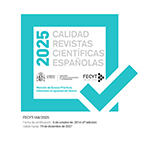La Renta Básica Universal basada en la evidencia
Resumen
Los proyectos pilotos de Renta Básica Universal (RBU) que se han ido implantando en distintos países del mundo han generado en Europa un gran interés, tanto por los datos recopilados, como por su alcance teórico. Este artículo analiza la evidencia empírica y modelos de experimentación de las políticas de RBU, a partir del mayor o menor grado de información sobre la previsibilidad de su impacto social que nos proporciona cada uno de ellos. Para ello revisamos la intención, el diseño y los resultados obtenidos de los diferentes casos y modelos experimentales a lo largo del tiempo y en diferentes países. En general, encontramos que ninguno de estos experimentos es en sí mismo suficiente para dotarnos de la evidencia que permita anticipar el impacto en todas las variables implicadas en el desarrollo de una RBU a largo plazo en contextos concretos. Pero al mismo tiempo este conjunto de evidencias traslada la carga de prueba hacia los detractores de la RBU: ninguno de sus efectos negativos queda probado con el análisis empírico. Este conjunto de evidencias apunta a una heterogeneidad de efectos que debe ser una referencia insoslayable para reducir la incertidumbre sobre el impacto de la RBU, para incorporar al análisis nuevas variables relevantes o para mejorar el diseño de su implementación.
Descargas
Descarga artículo
Licencia
La revista Política y Sociedad, para fomentar el intercambio global del conocimiento, facilita el acceso sin restricciones a sus contenidos desde el momento de su publicación en la presente edición electrónica, y por eso es una revista de acceso abierto. Los originales publicados en esta revista son propiedad de la Universidad Complutense de Madrid y es obligatorio citar su procedencia en cualquier reproducción total o parcial. Todos los contenidos se distribuyen bajo una licencia de uso y distribución Creative Commons Reconocimiento 4.0 (CC BY 4.0). Esta circunstancia ha de hacerse constar expresamente de esta forma cuando sea necesario. Puede consultar la versión informativa y el texto legal de la licencia.











